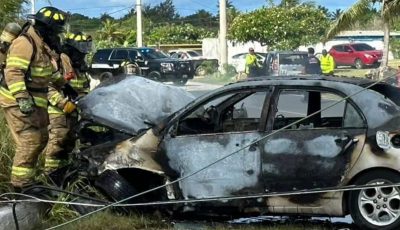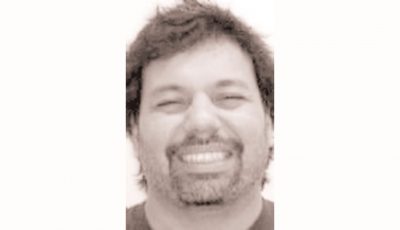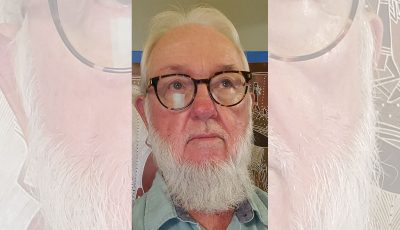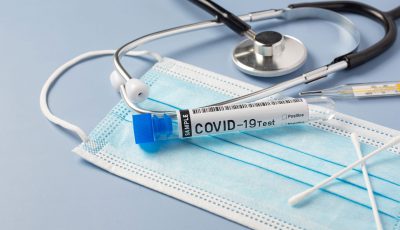Justices hear Crisostomo appeal
The CNMI Supreme Court heard yesterday the appeal of Joseph Acosta Crisostomo, a notorious habitual offender who was slapped with a life sentence for kidnapping, raping, and killing Emerita R. Romero.
Chief Justice Alexandro C. Castro later placed the matter under advisement. Associate Justices John A. Manglona and Perry B. Inos were members of the appellate panel.
In his appeal, Crisostomo asked the high court to reverse the jury’s guilty verdict; he demands a new trial.
Crisostomo, through counsel Janet H. King, asserted that Superior Court Associate Judge Joseph N. Camacho, who presided over the trial, made several errors and committed abuses during the trial.
King presented 10 issues in the appeal but her arguments yesterday focused on Camacho’s alleged abuse by excluding Crisostomo’s motion to admit Dr. David Haymer as an expert witness in forensic DNA.
Allowing Haymer to testify would have changed the outcome of the trial, King said.
King asserted that justice has not been served since Crisostomo’s arrest.
Of Camacho’s alleged failure to suppress identifying the 911 call, Manglona said the issue is more on violation of constitutional right rather than the court’s abuse of discretion.
King agreed with Manglona and stated that her position now is not an abuse of discretion.
Inos said King was saying that the wife was estranged from Crisostomo.
“You’re saying that she forgot his voice?” Inos asked.
King replied that it was her suggestion. She also stated that there were two voice tapes—the original and the other where the FBI removed background noise.
Inos asked if King presented a rebuttal that the voice in the 911 call was not Crisostomo’s. King said she did not, but that she cross-examined the former wife about her being biased against Crisostomo.
Inos also asked King about her argument that Crisostomo’s due process rights were violated when Camacho failed to change the venue of the trial to either Rota or Tinian because of the case’s massive publicity.
“The two newspapers also reach Tinian and Rota?” Inos asked.
King replied that victim Emerita Romero was a bar waitress on Saipan and associated with many people on the island.
In the government’s opposition, assistant attorney general Matthew Baisley said Crisostomo was convicted based on a mountain of evidence to overcome in his appeal.
Baisley cited among the “strong evidence” the defendant’s footprints, DNA evidence, 911 voice identification, black cotton fibers, shoe fibers, hair sample, rented Toyota Corolla, victim’s cell phone, cell tower records, among other things.
The second issue that Crisostomo presented in the appeal is that Camacho violated the defendant’s Fifth and Sixth Amendment rights when he allowed the prosecution to illegally obtain and use defendant’s footprint and gait while he was in custody awaiting his trial.
Third, King said, Camacho violated the defendant’s due process rights when he failed to change the venue of the trial.
Fourth, King said, Camacho abused his discretion when he improperly instructed the jury prior to the evidence in the case and did not repeat those instructions at the end of the case.
Next, King said, the judge abused his discretion when he failed to suppress the identification of Crisostomo in the 911 call as the procedure was tainted and suggestive.
Sixth, the defense lawyer said, it was plain error for the court to fail to declare a mistrial after the jury was repeatedly tainted by the government’s use of Crisostomo’s prior record.
Seventh, she said, Camacho erred in allowing William J. Bodziak to testify as an expert regarding barefoot morphology.
King said Camacho did not establish a finding upon which the CNMI Supreme Court could now review to determine that the judge properly applied the factors in Daubert before admitting Bodziak as an expert.
Under the Daubert doctrine, to testify as an expert, the witness must satisfy the requirements of Rule 702 of the Federal Rules of Evidence.
Next, King said, Camacho erred in denying Crisostomo’s witnesses from testifying via Skype.
King said the judge’s failure to permit counsel to use Skype to bring forth a witness clearly violated defendant’s right to due process to bring relevant material evidence vital to his defense.
Next, King said, Camacho erred in allowing testimony that Crisostomo had indicated he would take a lie detector test, and then refused.
Finally, King said cumulative errors by the trial judge require reversal.
The lawyer said that, taken as a whole, the cumulative effect of these errors resulted in Crisostomo being denied his right to a fair trial.
In the CNMI government’s opposition, Baisley asserted that Crisostomo’s everything-but-the-kitchen-sink approach is not persuasive, and in many instances, the holes in his arguments are as dispositive as they are obvious.
Baisley said the approach is understandable.
Baisley said given the mountain of forensic, eyewitness, and other factual evidence, Crisostomo is quite simply required to appeal everything to have any hope of overcoming a harmless error analysis.
Baisley said with the possible exception of the DNA issue, Crisostomo presents each of his arguments without providing any discussion of the standard of review.
Baisley said the defendant cannot escape harmless error.
If the DNA expert argument is conceded, Baisley said, evidence still shows that Crisostomo’s DNA was found on the victim’s vaginal swabs. Baisley said the presence of Crisostomo’s DNA is not in dispute.
Baisley said if Castro’s 911 identification is suppressed, evidence still shows credible voice identifications from detectives familiar with defendant’s voice.
If the footprint evidence is excluded, the prosecutor said, FBI agent Joe Auther’s testimony that the footprints were distinctive and appeared to be a match is still entered into evidence.
Baisley said defendant does not challenge: he was seen with the victim’s cell phone the day after the murder; he was operating a rental car fitting the description of the Corolla; his sister rented the Corolla, exchanging it the morning after the murder for no stated reason; hair and clothing fibers consistent with the victim’s hair and clothing were found in the Corolla; cell phone tower records place Crisostomo near where the victim’s body was found roughly around the time she was murdered; and defendant’s voice was identified by detectives familiar with his voice.
Baisley said Crisostomo cannot overcome harmless error because these facts would sustain his conviction beyond reasonable doubt.
“[Crisostomo] received a fair trial, and even minor mistakes do not alter that conclusion,” said Baisley as he asked the high court to affirm Crisostomo’s conviction.
On the first issue of excluding motion to admit Dr. Haymer as an expert, Baisley said Camacho properly excluded Dr. Haymer’s testimony as a DNA expert because Crisostomo failed to demonstrate that Haymer was qualified to testify as an expert; based his testimony on reliable principles and methods; and reliably applied those principles and methods to the facts of the case.
Baisley pointed out that Rule of Evidence 702 requires experts to offer reliable principles and methods that are reliably applied to the facts of the case.
Baisley said Crisostomo failed to establish that Dr. Haymer was qualified.
On the second issue about alleged illegally obtained and use of Crisostomo’s footprint and gait, Baisley said the footprint evidence did not violate the Fourth, Fifth, or Sixth Amendment.
Baisley said no court has ruled that a footprint is so materially different from a fingerprint that entirely separate Fourth, Fifth, and Sixth Amendment protections are necessary.
Baisley said Camacho was therefore correct to admit ink impressions of Crisostomo’s footprints obtained pursuant to a search warrant signed by a Department of Public Safety detective, a prosecutor, and issued by Superior Court Associate Judge Kenneth L. Govendo on Dec. 23, 2013.
Baisley said defendant concedes he did not object, at any point, to the admission of footprint evidence on Fourth or Fifth Amendment grounds.
Baisley said footprint evidence did not violate the Fourth, Fifth, and Sixth Amendments.
On the third issue about change of venue, Baisley said Camacho properly denied defendant’s motion for a change of venue.
Baisley said Camacho did not abuse his discretion when he refused to submit a questionnaire to the jury.
On the fourth issue pertaining to jury instructions, Baisley said the jury instructions did not affect the outcome of the proceedings.
On the fifth issue regarding 911 call, Baisley said admission of 911 identification was not plain error or an abuse of discretion.
The jury, he said, would inevitably have heard compelling testimony identifying Crisostomo on the 911 call, and thus any error was harmless.
On the sixth issue about failure to declare a mistrial, Baisley said the witness’ three identical references to “jail” and her identification testimony did not warrant mistrial.
Baisley said Camacho’s pretrial ruling excluded only references to the 2006 murder.
On the seventh issue pertaining to Bodziak, Baisley said Camacho properly admitted Bodziak as an expert.
Baisley said Bodziak easily satisfied Rule 702 and so any error was harmless and that Camacho made the necessary findings.
Baisley said Camacho correctly decided the Skype issue. He said there would be no abuse of discretion not to permit such testimony by Vernon Wesley, a defense witness.
On the ninth issue about the lie detector test, Baisley said admitting polygraph testimony with a limiting instruction was not an abuse of discretion and that defendant opened the door to the polygraph testimony.
On the last issue about errors, Baisley said Camacho did not commit cumulative errors warranting reversal.
Baisley said defendant fails to demonstrate the existence of any errors.
Moreover, he said, defendant’s brief fails to provide any analysis of why the cumulative error would have “affected the verdict.”
On April 24, 2014, a jury reached a guilty verdict against the then-40-year-old Crisostomo as to the charges of first degree murder, kidnapping, sexual assault in the first degree, and robbery.
Camacho, who presided over the trial and decided the misdemeanor charges, found Crisostomo guilty of assault and battery and disturbing the peace.
The trial began on April 17, 2014. After deliberating for six hours, the jurors reached a unanimous guilty verdict on April 24, 2014. Camacho also found the Crisostomo guilty of the misdemeanor charges.
On May 28, 2014, Camacho sentenced Crisostomo to life imprisonment.
Camacho, describing the last minutes of Romero’s life, said she was “scared, screaming and begging, bruises and scratches on her arms and legs, violently penetrated and raped, strangled and gasping for air. With her spirit gone, thrown in an abandoned bathroom like a piece of human waste.”
Then-interim Chief Prosecutor Brian Flaherty and then-assistant attorney general Margo Brown-Badawy called in 31 witnesses.
King called one witness. She filed 44 pre-trial motions. Guam lawyers Jeffrey Moots and F. Randall Cunliffe assisted King in the case, but they did not show up during the trial.
Romero, 37, was last seen boarding a car near her house in Garapan in the early morning of Feb. 5, 2012. Two days later, Federal Bureau of Investigation agents found her body in a small bathroom at the abandoned La Fiesta Mall in San Roque/As Matuis. Autopsy showed she was beaten and strangled with a pair of leggings.



























